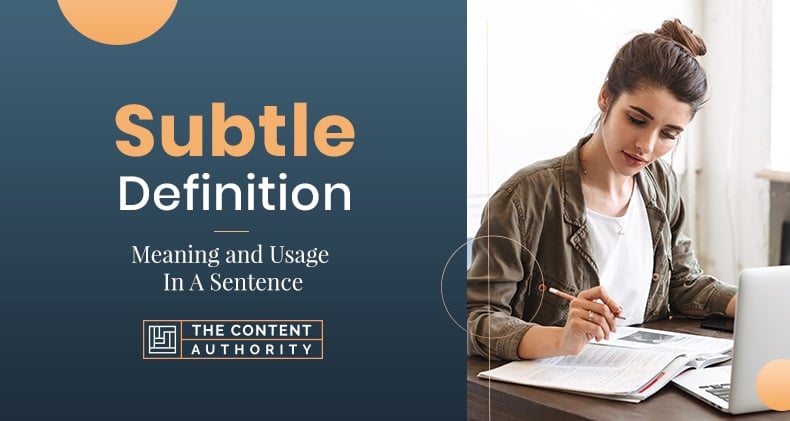We all use words every day, often without giving them much thought. But have you ever stopped to contemplate the word “subtle,” its definition, meaning, and usage in sentences of different contexts? For many people, subtle has one specific meaning: delicate or precise.
Subtle means something that isn’t loud, flashy, noticeable, intense, or obvious. Something that might be hard to spot at first until you look closely. When you use “subtle” in a sentence, you try to avoid any offense or too much attention.
Today we’ll explore the word “subtle” and take a closer look at its definition, meaning, spelling, examples in sentences, history and etymology, and everything in between. From this, you can easily apply the word without a doubt. Here we go!

What Is the Definition of Subtle?
The word subtle is defined as being “not obvious,” describing the state of being so. Do you find something hard to explain or understand? Subtle is the correct word to use in such instances. The word also applies when you can make fine distinctions or when something happens in an unclear way.
Subtle doesn’t have a concrete and exact definition. There are many word parts to it, and each depends on the other for a successful connection. To find out the exact subtle definition, you need to break down its word parts to get back to the original definition. The word parts meanings include:
- Subtly – in a delicate manner.
- Subtlety – the state of being subtle or having many parts that are difficult to define, understand, and interpret.
- Subtleness – having many parts or aspects that are difficult to understand or explain.
What Is the Meaning of Subtle?
The word “subtle” also means: hard to see or notice. That’s why you can use the word to describe a tricky or crafty behavior rather than straightforward. Simply put, subtle means an indirect yet creative way to express yourself without showing the real purpose.
While it is used to describe keen or detailed insights or perceptions, “Subtle” may also be used to describe something that is not at first evident or noticeable. For example, “subtle color changes” may mean something slightly different about how something looks (the color), but it is not immediately obvious what specific change has occurred.
This applies to the description of things like art, language, humor, mathematics, and abstract ideas, as well as other things. Some of the common synonyms include words like perceptive, low-key, over-nice, keen, powerful, ingenious, and so on.
In a nutshell, the word ‘subtle’ has numerous meanings, and The Oxford English Dictionary (OED) gives the following six definitions:
- Not obvious or easily understood; cryptic, ambiguous
- Overly or excessively subtle
- An element of something difficult to detect
- Metaphorically thin in density
- Exhibiting or calling for great craftiness, skill, or ingenuity
How to Use Subtle in a Sentence?
You can use subtle as an adjective, verb, or adverb based on sentence application. The good thing is you don’t have to struggle with the application if you know the subtle definition and meaning.
As an Adjective
Use “subtle” to describe various undertakings. You can use the word when telling jokes intended to make the reader or listener think about your statement and discover the “true” meaning of what you said. These types of jokes can be difficult to understand but can often be understood upon further reflection.
Subtle also comes out perfect when describing weather changes. Example: The subtle weather changes made the flowers bloom earlier. Despite the “not easy to notice or describe the weather,” something noticeable came out.
When it comes to art, not everything is always immediately evident or quickly found. That’s why describing unique artistic or aesthetic qualities requires using the word subtle to mean not very noticeable or obvious. For instance, the subtle colors in the painting make it beautiful.
In information security, “subtle” refers to an attack difficult to detect. For example, a “subtle attack” might include a malicious actor sending an email to a target, which appears to be from a friend. In the email, the malicious actor asks the target to click a link, which leads to the victim’s credit card details being stolen.
As a Verb
When used as a verb, subtle can mean “to make something less strong” or “to change something in a not too obvious way. For instance, in a sentence, the person working on her bandaging skill was trying to alter the design subtly.
As an Adverb
Subtle as an adverb can mean either “not easy to notice” or “done carefully.” Example: She looked subtly at the man across the bench. It’s also used in phrases like “subtly different” or “subtly similar.” Example: The houses are subtly different colors.
10 Examples of Subtle in a Sentence
Many people use the word “subtle” interchangeably with words like “shy,” “unassuming,” or “discreet.” However, this is not always accurate. Subtle is a more multifaceted word than most people give it credit for and can be used to describe many different things — an action, an emotion, a tone of voice, etc.
Here are ten examples to demonstrate the different ways one might use the word “subtle” in a sentence.
- The director’s latest film is aesthetically very subtle and unexpected for such a mainstream movie industry.
- The chef’s subtle blend of spices makes the food an excellent evening meal.
- I admire her subtle sense of humor in the face of adversity; it always puts me at ease.
- His subtle impression of my life will never fade away.
- They’re so subtle you might miss their presence entirely, but their effects are anything but unnoticeable to the environment.
- There is something very subtle in her tone of voice that makes me feel like she’s up to something when she says it.
- They were always so subtle about their feelings that it took me a very long time to figure out the depths of their love for one another.
- His smile was too subtle for many people to notice, but he knew that he could effortlessly brighten someone’s day.
- The dialogue in this film is very subtle, which makes analyzing it an exciting challenge.
- I find his subtle essence in the air intoxicating and relaxing at the same time — it’s hard to explain what I mean by that, though.

How Do You Spell Subtle?
From the phonetic alphabets, the word subtle is spelled with a sharp “s.” The “u” and “l” spellings go together. “Please note that the “b” is silent.
Spelling words correctly is vital in written and oral communication. Most subtle word applications involve describing how something looks or feels. With proper spelling, you put the correct message across. The major problem is that the word isn’t spelled the way you pronounce it.
How Do You Pronounce Subtle?
Subtle is pronounced like “suttle” or “shuttle.” As mentioned earlier, “b” is silent. Being originally an Old French word, b was added to make it Latin.
Most people that encounter this word for the very first time mispronounce it. But that shouldn’t be the case for you; pronunciation also depends on the word source. Most English words are sourced from Greek and Latin, and pronunciation tends to fall in that category. More so, how you pronounce and write a word highly depends on whether it falls in the British or American context.
How Many Syllables Are In Subtle?
You can divide subtle into two syllables. That is sub-tle.
Syllables are sounds created when you pronounce vowels in a sentence. That means the number of syllables is dependent on the number of vowel sounds. If the word vowels are silent, you don’t count that as a syllable.
If you want to count syllables, the easiest method is to say the words and hear how many instances you pronounce the vowels as different sounds. You can also do the following to determine syllables:
- Put your hand below the chain and record a syllable when the chin touches the hand.
- Clap your hands every time you mention a vowel in a sentence.
- Count your pauses in a word.
History & Etymology of Subtle
The word ‘subtle’ is a borrowing from the French ‘subtile,’ which is itself a borrowing from the Latin ‘subtilis.’ These words come from sub-” under, below” + tilis “having thin layers.’ ‘ The word meant “thin, fine,” in reference to cloth.
In the mid-1500s, English speakers began using subtle as a term emphasizing fine differences in meaning or judgment. The word has been used in English since the 13th century. The first reference is in Dante’s Inferno; ‘subtle shifts of meaning.’
The word itself can only give us a small glimmer of insight into what it truly means. To fully describe what subtle means, find the original meaning of its root words (mentioned earlier in the definition section).
Subtle Synonyms
- Understated
- Indirect
- Ingenious
- Exquisite
- Profound
Subtle Antonyms
- Hard
- Forthright
- Ignorant
- Unsubtle
- Stupid
When Was Subtle First Used?
Etymology Online Dictionary evidence that subtle was first used around 1300.
Initially, the word came from Old French, meaning “finely woven.” This is exactly what subtlety means today. At its heart, subtlety refers to the fine art of something that cannot be easily defined or interpreted.
The modern-day definition still reflects that idea. It also encompasses the idea of being not obvious or apparent. Subtle today means something so refined or delicate that it cannot be easily explained or identified by usual standards. Typically, when we use subtle, we are trying to indicate something with many layers or is concealed indirectly.
Conclusion
Subtle is a word that can be used in many different contexts. When it comes to the definition of subtle, Merriam-Webster defines it as “not easily seen or detected,” and Oxford Dictionary says “difficult to detect; not obvious.” Subtle definition coupled with examples and mode of use makes learning straightforward.
Whether you’re a scholar, student, writer, or grammar fanatic, understanding everything about subtle and its applications allows you to contextualize the word appropriately. How often do you use the word subtle? Let’s hear from you!
Shawn Manaher is the founder and CEO of The Content Authority. He’s one part content manager, one part writing ninja organizer, and two parts leader of top content creators. You don’t even want to know what he calls pancakes.

